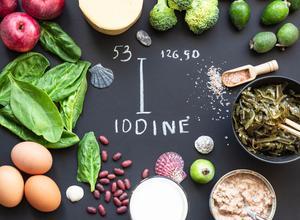
Iodine
Iodine is an essential mineral for the production of thyroid hormones.
Food sources of iodine:
Seaweed contains more iodine than any other food. Other rich sources of iodine include cod, plain yogurt, milk, cheese, eggs, shrimp, and other seafood.
Plant sources have lower amounts of iodine. Due to the importance of iodine in the diet, this substance is added to table salt (iodized salt) and other foods such as bread, pasta, and breakfast cereals.
Daily iodine requirement:
The requirement varies with age but generally varies between 100 and 150 micrograms. Both sexes need the same amount of iodine, but women need about 220 micrograms during pregnancy and more during breastfeeding, and about 290 micrograms per day.
Consume a combination of the food sources mentioned above daily to get the daily requirement of iodine.
Complications of iodine deficiency:
Iodine deficiency during pregnancy impairs fetal growth and development, and unfortunately, iodine deficiency is the most common cause of congenital disabilities in the world, which is easily preventable.
The deficiency of this substance in infancy and childhood also causes growth and development disorders.
In old age, iodine deficiency causes an abnormal enlargement of the thyroid gland and its protrusion in the front of the neck, which is called a goiter. Enlargement of the thyroid gland (due to iodine deficiency) is due to compensating for iodine deficiency by increasing blood that passes through this gland.
Groups most at risk for iodine deficiency:
Most of the earth's iodine reserves are in the oceans, and small amounts are found in the soil. On the other hand, the farther we go from the oceans, the less iodine in the soil. Therefore, plants that grow in mountainous areas have small amounts of iodine, and people living in these areas are at risk of iodine deficiency. For this reason, the highest rates of iodine deficiency in the world are found in people living in the Himalayas, the Alps, and the Andes. Fortunately, iodine deficiency is rare in the United States with national programs to add iodine to salt and food, but there are still more than two billion people in areas where iodine deficiency is common. These people must use iodized salt or foods containing enough iodine to avoid the risk of iodine deficiency.
Excess iodine intake:
Excessive iodine intake (such as deficiency) can cause goiter and subsequent hypothyroidism. It is because too much iodine increases the secretion of thyroid-stimulating hormone or TSH (Thyroid Stimulating Hormone), decreases the production of thyroid hormones, and causes goiter. People who have prescribed iodine-containing medications due to severe iodine deficiency are at risk for iodine poisoning. Symptoms of intoxication include burning in the mouth, throat, and stomach, fever, nausea and vomiting, diarrhea, abdominal pain, a weak pulse, and in more severe cases, coma.
In short, it is recommended that the body needs iodine in combination with the food as mentioned above sources and iodized salt to protect people from the risk of iodine deficiency. This issue is more critical in pregnant women and during breastfeeding.




